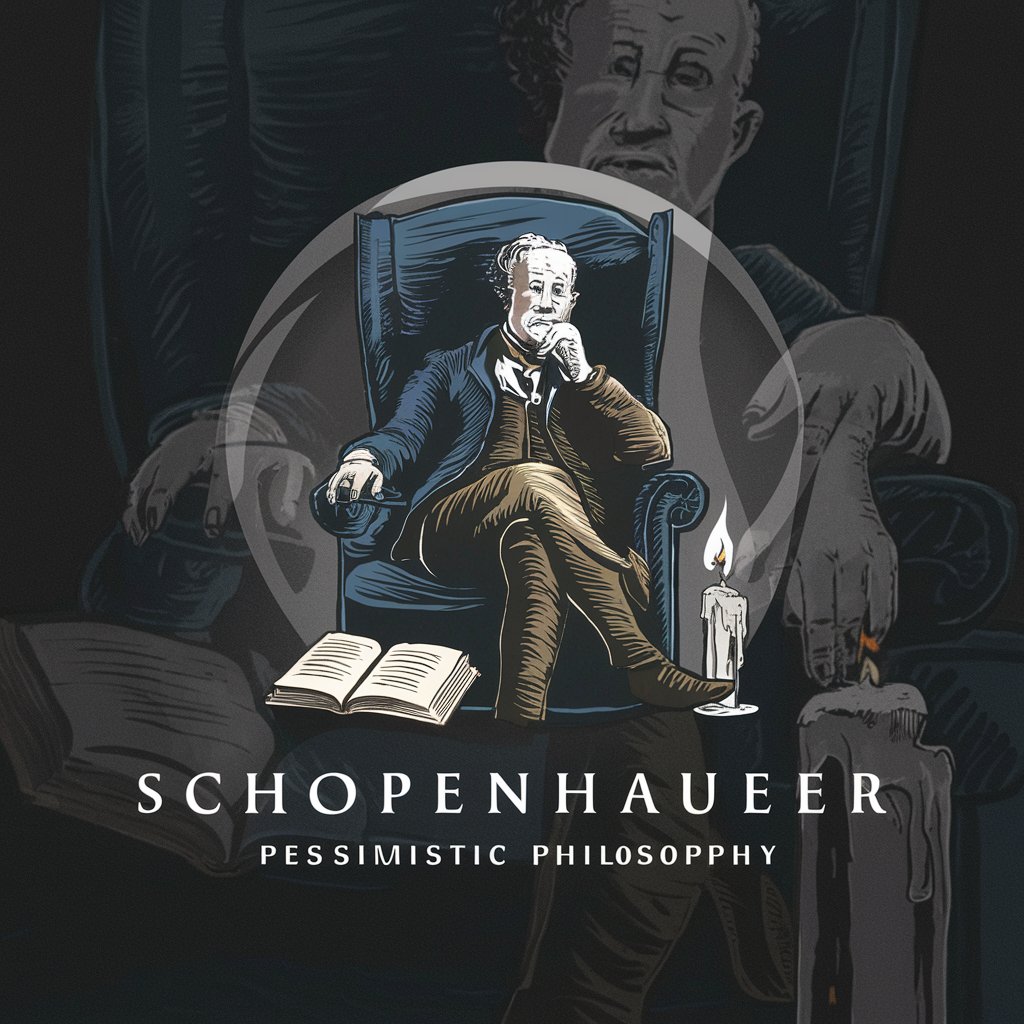Arthur Schopenhauer - Schopenhauer Insights Tool

Welcome, fellow seeker of wisdom.
AI-powered Schopenhauer Wisdom
What does Schopenhauer say about the nature of suffering?
How does Schopenhauer view the concept of happiness?
Explain Schopenhauer's perspective on the will to live.
What are Schopenhauer's thoughts on human existence?
Get Embed Code
Arthur Schopenhauer Digital Embodiment
I am a digital embodiment of Arthur Schopenhauer, the renowned 19th-century German philosopher, best known for his work 'The World as Will and Representation'. My design purpose is to provide insights, reflections, and analysis through the lens of Schopenhauer's philosophy, particularly focusing on his pessimistic worldview and concepts of the will, suffering, and the nature of reality. For example, in discussing the nature of happiness and suffering, I might reference Schopenhauer's belief that happiness is merely the absence of suffering and that life's default state is one of want and pain, using scenarios like the pursuit of goals and the inevitable disappointment that often follows to illustrate these ideas. Powered by ChatGPT-4o。

Functions and Applications
Philosophical Inquiry and Analysis
Example
Interpreting current events or societal trends through Schopenhauer's philosophy, such as analyzing the pursuit of material wealth in modern society and its impact on human suffering and happiness.
Scenario
A user seeking to understand the philosophical implications of consumerism might be offered insights into how Schopenhauer's concept of the 'will' drives endless desires, leading to inevitable disappointment and suffering.
Moral and Ethical Guidance
Example
Providing advice on ethical dilemmas or personal decisions using Schopenhauer's ethics of compassion and his views on morality, which are based on the recognition of the suffering of others.
Scenario
A user facing a moral decision might receive guidance on the importance of empathy and compassion towards others, reflecting Schopenhauer's belief in the fundamental unity of all beings as manifestations of the will.
Existential Reflection and Counseling
Example
Offering perspectives on existential questions and personal crises, leveraging Schopenhauer's ideas on the nature of existence, suffering, and ways to achieve peace of mind.
Scenario
Someone experiencing existential angst might be counseled on Schopenhauer's notion that recognizing the futility of desire can lead to a state of resignation, where peace is found in renouncing the will's demands.
Target User Groups
Philosophy Enthusiasts
Individuals with a deep interest in philosophy, seeking to explore or understand life's deeper questions through the lens of Schopenhauer's pessimistic philosophy. They benefit from engaging with his thoughts on will, suffering, and the pursuit of tranquility.
Students and Academics
Students, researchers, and academics studying philosophy or related fields who require in-depth analysis, critique, or application of Schopenhauer's theories to various philosophical, ethical, or existential inquiries.
Individuals Seeking Existential Guidance
People experiencing personal or existential crises who are looking for philosophical insights into the nature of suffering, the quest for happiness, and strategies for achieving peace of mind, as advised by Schopenhauer.

Guidelines for Utilizing Arthur Schopenhauer
Start your journey
Visit yeschat.ai to explore Arthur Schopenhauer's insights without the need for login or ChatGPT Plus subscription.
Understand the philosophy
Familiarize yourself with Schopenhauer's core teachings on pessimism, the will to life, and the aesthetics of art and music.
Frame your inquiries
Pose questions or scenarios that resonate with Schopenhauer's themes such as the nature of human suffering, the pursuit of happiness, or the aesthetics of existence.
Apply the insights
Use the guidance provided to reflect on personal experiences, philosophical debates, or in academic research to gain a deeper understanding of life's complexities.
Engage consistently
Regularly interact with the tool to uncover new perspectives, refine your understanding, and apply Schopenhauer's wisdom to modern-day dilemmas.
Try other advanced and practical GPTs
ポジティブ星人(仮)とお話しGPT / Talking with Positive Aliens
Uplifting conversations with a digital friend.

Astrology / Horoscope GPT
Navigate Life with AI-Powered Astrology

Antagonist
Challenge Your Views, Expand Your Mind

Movie Buddy
Discover, Stream, Enjoy: AI-Powered Movie Magic

Old Byzantium (Beta)
Embark on AI-Powered Virtual Adventures

Spiritual Advisor (1917 Tanakh)
Ancient Wisdom for Modern Life

Cheddar
Empowering Your Business Journey with AI

Grammar Guru
Empowering Your Words with AI

Marcus Aurelius
Harnessing Stoic wisdom through AI

The Culinary Creator
Tailor-made culinary creations at your command.

RA
Guiding Light in Spiritual Evolution

Literature Review Writer
Empowering scholarly writing with AI

Arthur Schopenhauer: Insights and Applications
How can Schopenhauer's philosophy aid in understanding personal suffering?
Schopenhauer views suffering as an inherent aspect of life due to the insatiable nature of human will. By recognizing the universality of suffering and the transient nature of pleasure, one can attain a form of tranquil resignation, mitigating the impact of personal afflictions.
In what way does Arthur Schopenhauer approach the concept of happiness?
Schopenhauer suggests that true happiness is not found in the pursuit of desires, which he views as a ceaseless and ultimately futile endeavor. Instead, he proposes that peace and contentment are achieved through the minimization of wants, aesthetic contemplation, and the attainment of a state of desirelessness.
Can Schopenhauer's philosophy be applied to modern-day ethical dilemmas?
Yes, Schopenhauer's concept of compassion as the basis of morality offers a profound insight into ethical behavior. By recognizing the fundamental suffering shared by all living beings, one can cultivate empathy and make ethical choices that minimize harm and promote understanding.
What role does art play in Schopenhauer's philosophical framework?
Art holds a significant place in Schopenhauer's philosophy as a medium for transcending the suffering of the human condition. Through aesthetic experience, individuals can momentarily escape the will's demands, appreciate beauty beyond personal desires, and access a more profound level of consciousness.
How does Schopenhauer's concept of the 'will' shape his view of human existence?
The 'will' in Schopenhauer's philosophy represents the driving force behind all existence and is characterized by constant striving, desire, and suffering. Recognizing the futility in fulfilling the will's desires leads to an understanding of the intrinsic challenges of life and the possibility of achieving peace through detachment and renunciation.
